Docker CEO Steve Singh On The VMware Relationship, Security, And The Opportunities Around Containers For Partners

Container Craze
Docker CEO Steve Singh told attendees of the Best of Breed conference that his company's ability to deliver a highly portable, cloud-native, cost-cutting platform for transforming IT systems gives the channel a play unlike any other.
The new CEO of the groundbreaking container tech company, in a discussion with The Channel Company CEO Robert Faletra, told solution providers gathered in Atlanta that Docker's platform will win in a competitive market because of its openness and portability -- enabling digital transformation without locking customers into any one provider.
And moving legacy applications to Docker, enabling them to run on any modern infrastructure, typically cuts costs in half. Those savings result from a substantial increase in application density, reducing the number of virtual machines needed by putting more workloads on fewer servers.
Here's what Singh told the audience at the Best of Breed conference.

How are trends in cloud computing paving the way for opportunities around container technology?
There are a few major trends we see happening and our platform sits in the middle of these trends. The first is, I've been in the tech industry for 30 years and I've not seen a wave as large as the move to public cloud. In my view, you're going to see the first trillion-dollar software company from the move to public cloud. It's going to be the Microsofts, AWSes or the Googles of the world. The shift to public cloud will impact every single company in the world, both larger or small, and that is being enabled by containers. The second shift we see is the move to edge computing. What's important to understand is that 95 percent of all compute happens in the core of the network. Where we see the world heading is 50 [percent to] 60 percent of all compute will happen at the edge. I'm talking about digital twins -- you can actually see the health of those systems, whether you are talking about buildings, cars or jet engines, you're able to understand what's happening and how you service these products.

How do microservices come into play?
The next big trend is really the move to microservices, and this one is near and dear to my heart because with Concur and Salesforce, they are cloud companies that build best-of-breed applications and go after the SAPs and Oracles of the world with monolithic apps that were really great in one area but were average in everything else. The reason why they bought all these other companies is because we were fantastic in our respective areas. But that trend from monolithic apps to cloud apps is continuing to microservices, and that's important because the changes you want to see in edge computing and the changes in the services being delivered don't happen until the apps evolve down to the smallest component parts, much like building blocks. Part of delivering real value and ecosystem means you get to share in the system of record for that ecosystem. When you think about health care and CRM and financial systems, we have to get to this model of a shared system of record where other members of the community can actually add value to that system.

Why is the Docker container stack disruptive, and how partners can use it?
The single biggest one is the move to public cloud, and this is where Docker is focused today. This is the number one area that we are putting all our investment in. We have this great container platform that allows you to do a lot of things, but just like any company, we need to pick an area of focus and for us, helping customers take legacy apps, moving them to the Docker platform, and allowing them to run it on any infrastructure because it's hybrid cloud world, does a couple of things -- it drives massive savings for customers, typically 50 percent cost reduction in a cost structure, but it also opens up real opportunities for the customer and our partners to innovate within that environment.

Where does the 50 percent savings come from?
A few different areas. The biggest is, honestly, in the mass reduction in number of VMs [virtual machines] and that's not good or bad, it's just the reality. The other is that there is a massively increased density factor on compute, and so we can put a lot more workloads on a fewer number of servers. If you are a [company like] Nestle, and you are going to take a bunch of information and business systems and move it to the public cloud, doing a one-to-one move is not necessarily all that advantageous.

Customers don't always move quickly to the bleeding edge. Walk us through working with a partner to help a customer.
In the early stages, businesses don't move as fast as you'd like. Having said that, there are always early adopters and I think for our biggest strategic partners, it's about helping to move that curve of adoption to be much faster. For example, Hewlett-Packard, a fantastic partner of ours, Cisco, IBM or Accenture, we are working with each of those partners to find proof of concept. You walk into [a meeting with a customer] and the theory is if you move your legacy apps and move them to the Docker platform, we can cut your costs in half. When you say that to someone, the first comment is 'prove it to me' and that's a fair request. When I joined Docker I had a good conversation with someone over at Microsoft that said 'I'd love to partner with you.' His view was, the more people move to Docker, the more business they get on Azure. In fact, for every dollar we generate, he generates $7. The way we went after this is we said we will help a customer with proof of concept. Give us the first set of applications, we'll move them to the Docker platform and we'll show you.
Are you doing those proofs of concept with solution provider partners?
Absolutely. Our solution providers and our hardware partners are making five to seven times what we make on these relationships.

Where are solution providers making money with Docker?
We have one scenario where we are working with a customer to only migrate the legacy apps to Docker, so you're seeing savings not two years from now, but in real time. For MetLife, the ROI they are generating on a monthly basis is paying for the next set of applications to move over. Our partners are coming in and doing business process re-engineering with our customers. If you're a company asking, 'Where does compute go and where do I add value to my customers?' One of the things you're going to want to do is drive more innovation.
In the three years I was at SAP, I met with over 300 CIOs and it almost got to be comical because the story was the same across every company -- 80 [percent to] 85 percent of the budget was spoken for before the year started, and then you had these competing interests in how to drive innovation in your product set, and how to serve customers better. That's a hard set of objectives to reconcile. When we come in and we are able to reduce their cost structure around their legacy apps, our partners are helping us not only move those legacy apps over, but on top of that, working with customers to drive innovation and how to differentiate their products and services. Those are the areas where we see the greatest return for our partners.
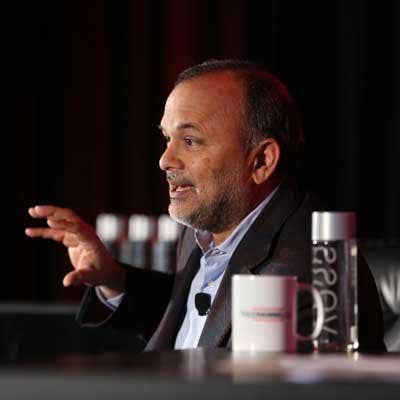
Why should solution providers partner with Docker?
The one thing Concur taught me was the way you succeed is you don't solve for what you get out of it or how you benefit, but solve the problem the way the customer wants it solved. In my view, if you look at what the customers are looking for in this move to public cloud, the number one thing is portability, with the exception of one CIO that I met. Every other CIO said, 'I want to deliver my apps on top of any infrastructure.' The other things are, they want added security, immediate ROI and proof of concept. I think Docker is unique here. To my knowledge, there's not another platform that exists that allows you to take your legacy or brand-new apps, put them on the Docker platform, run them from there and then run anywhere, whether it's on public cloud infrastructure or your own internal infrastructure, or on the edge. That flexibility is massive. Go back to the last 20 years of apps on build on Oracle and SAP, who spent hundreds of millions of dollars moving apps off of Oracle onto their own database because the fee structure went up. Why would anyone think the fee structure wouldn't continue to move up?

Is there a business for the partner base to containerize applications out there today so they run more efficiently?
It's not only a viable business model, but we have partners that do it today. HP's next business is building an app migration factory. What we are committed to is for partners, we want to make sure our technology is solid enough that we can make the absolute minimal changes to the application stack, but as you get deeper into the application stack you have to figure out how to move those applications over in a model that isn't disruptive to the customer. We have partners building out app migration factories and services around that to help move applications over.

How do partners build out a container practice?
Come to Docker.com and register as a partner. We'll make sure you get all the training that you need, but I think there are at least two opportunities around the container platform or any partner, and the first is on the services side and the sale of infrastructure. Help us with relationships with customers where we can move those apps over, and you are a part of that engagement process. I think there is a longer-term opportunity as well and some of our partners are already on it. You can build services on top of the Docker platform that are apps or services that add value to Docker, and we are happy to sell that into the customer. If you go out 10 years, this will be a platform upon which all apps can sit -- whether they are old or new -- and they can run anywhere, whether on the core or on the edge. But there is no way any one company can build everything you need. But, you can be an open platform that allows everyone else to add services on top of it.
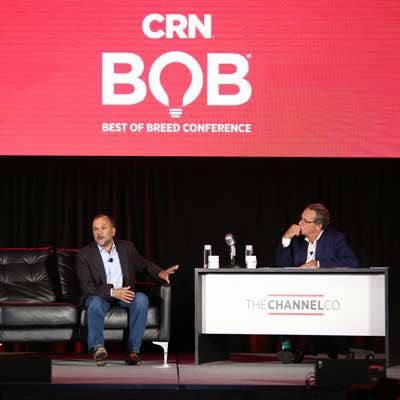
Does being open source put Docker at a disadvantage?
That's the reaction I had when I joined Docker as a board member. When you dig in, open source really allows you to do two things that are important to the customer. The first is you drive adoption and standardization, which is critical to the corporate customer that they know they have a platform they can rely on and that's valuable because every time you have a proprietary environment, the temptation for lock-in is huge. I've not see a company that hasn't exercised that temptation towards lock-in. The second is that I think what is happening with Docker adoption, is it's not fully appreciated. There are 10 million or so developers that build on top of Docker. There are 20 billion images that have been put on the Docker engine and 1 million-plus applications built on top of Docker, and all of that happened in four years. Pulling that off in a closed-source model is impossible. A company of 300 people today did that.

How big is this opportunity and are partners in danger of losing customers if they don't get in on it?
I have relationships with CIOs, and I called the CIO of a company that is not known for moving fast. I walked them through what we can do with the Docker platform, and his comment was, can we do the PoC next month? So, it's a movement that I didn't expect. The reason is simple. He's got $5 billion IT spend, $3 [million to] $4 million that is in application infrastructure management, and we will cut that in a meaningful way.
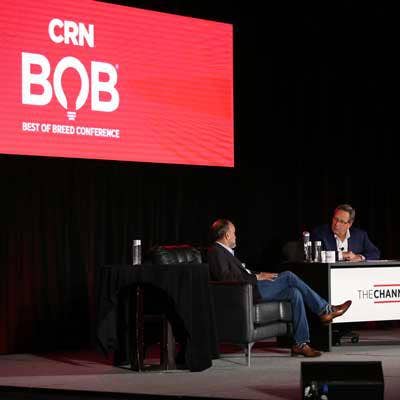
Will there be opportunities for partners that work with midmarket customers?
This will work for the midmarket, too. Our customers are across the spectrum, but obviously, the ROI is bigger based on the larger IT spend, but that is just a piece of this equation. This idea that containers won't be the default unit, if you bet against it, I think you're betting wrong. The reality is that will be the atomic unit for how all apps are managed, and the reason is because it provides tremendous customer value. A customer can, through a click of a button on a piece of software, say, 'I want to run this application here,' or create rules based on capacity or data privacy or availability. 'I want these workloads to move in this model.' You can't do that easily without containers. You can potentially do it on other platforms, but you can't do it on the lowest possible cost structure.

Talk about the road map. At the container level, you're pretty much the de facto standard, at the orchestration level there's Kubernetes and Google, then you've got the management layer, which is Docker Enterprise and others. Should partners go into all three?
Our job ought to be that we deliver a platform that allows you to plug-and-play any components you like. Not all components have to come from Docker. That's the posture we're taking into the future. We want to be a completely open platform that allows anybody to say, ' like this piece and I'm going to plug this in.' It's incumbent upon us to innovate aggressively so we can have components at the app management layer, security and the like, but if others can do a better job, great. If somebody else can out-innovate us, they deserve to win. Our view is you take the Docker platform and take any plug-and-play component you like and drop it in, which gives you ultimate flexibility. If we don't innovate, and if we don't drive value and ROI fast enough, you have the ultimate flexibility to pick somebody else.
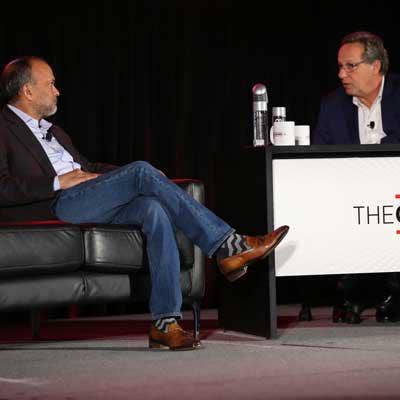
It's all about driving speed to value and ROI?
I don't know how you get a better value prop from that, how you get a better partner ecosystem than that. One thing we haven't talked about is our investments in distribution. Docker is an R&D-heavy company. Half of our company is in product development. We're open source and we have a very large community of developers that add value on top of our ecosystem. If you look at the next year, we can't hire salespeople fast enough. We can't spend on marketing fast enough. The ROI in MTA – modernizing traditional applications – is so clear, so straightforward that we're not seeing customers saying no. What we're seeing is, 'When can we get moving on this?' If you're seeing that happening today, in such an early stage environment, I'd say this is a perfect opportunity.
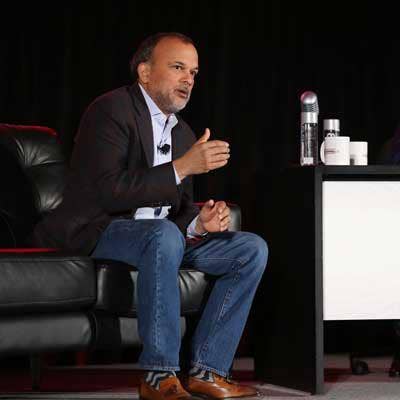
What type of talent do solution providers need to make this happen?
A lot of the services investments that companies here have already made are very applicable to the Docker system. The deep relationship with customers is applicable here. Business process re-engineering is very applicable in this environment. One of the reasons you use the Docker platform to go drive this kind of savings in moving apps to public cloud infrastructure or hybrid cloud infrastructure is what do you do with the savings? What you're going to say how do I drive more innovation? Some of that might be you're going to buy software from ISVs. Some of it is going to be look, I've got things I can do internally that take that data and drive value out of it. How do I use that information to better serve or understand my customer?

How big is the company, and how fast is it growing?
We're a private company, so I can't share a lot. I can tell you that we're growing at 150 percent-plus year over year and expect that to continue for at least another few years. I'm hoping to get to profitability in mid-2019, and that's important. Having built a business before, that's important to me because it gives us an unbelievable amount of freedom. Having said that, what I committed to my investors and committed to the team: Every penny above a minimal operating margin, I want to invest back in the business. I want to invest it in greater innovation, greater channel investment, greater partner investment. How do we actually help sell our partners' products and services through our channels?
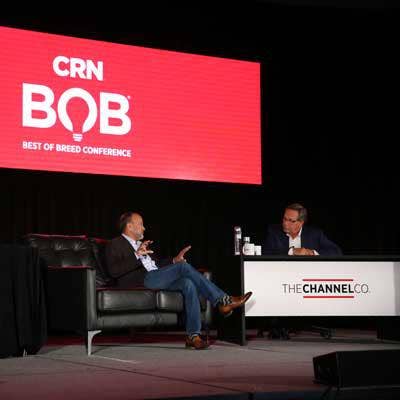
Does your software work only with app developers and not with off-the-shelf software? Do you build a containerized version of an Oracle app?
It works with off-the-shelf software as well. Oracle became a partner that is actually delivering the vast majority of its applications now in Docker containers. You shouldn't be overly surprised to see every other software vendor do the same.

With a customer using Oracle or SAP, how do you avoid increased fees over time? if you're running a proprietary app in a container, you're still going to pay a license fee.
You're absolutely going to pay a license fee. When you build your apps on another platform, the cost structure of the platform is something you're going to have to take account of in your long term. The move to public cloud should be viewed the same way. As you move to a public cloud environment, that's part of your cost structure going forward. The piece that's important to understand is that Docker gives you the flexibility to move at the click of a button any of those apps to any infrastructure provider. That gives you ultimate flexibility in having a cost-efficient relationship with those providers.
What's the minimum infrastructure that the cloud provider needs to offer up?
You can literally take one app, put it on Docker, and run it in a dynamic environment. You can do it in a bare-metal environment, you can do it in a thin OS environment or on top of VMware.

We heard Michael Dell comment on VMware's strategy, and their view is that containers are great, we believe the world is moving to containers, but ultimately we're going to provide a layer of management and security that's going to remain important. Where do you think this is all heading?
It's not a zero sum game. Lots of people get to succeed. I have a tremendous amount of respect for what Michael Dell has accomplished. I have a different view on this. I think the customer benefits from having a completely independent platform that allows them ultimate flexibility on where they manage that app environment, whether it's internal or external. Anytime there's motivation to say I want to optimize for one infrastructure over another, I don't think you are as faithful to the customer as you need to be. I'm not suggesting that they won't. I have zero motivation to do anything other make sure we give our customers massive choice. Customers are embracing that. That doesn't mean that Dell won't succeed as well. We're talking about a marketplace that compared to ERP is just as big or bigger. Can there be multiple multibillion companies? Yes. I think Docker can be one of those companies.
Do you work with all the public cloud companies? You work with Azure and AWS.
We do. We have alliances with Alibaba, IBM, Microsoft, and you'll see some others announced.

What's the channel strategy? Are you trying to leverage other organizations' channels? Are you trying to build your own channel?
Both. This is a channel-oriented play, a channel-oriented opportunity. If there's an opportunity to work with you on an account, we're in. Please register. We have a deal registration model. We want to be faithful to our partners that walk us into customers. Having said that, anytime you have an early stage opportunity like Docker, like the container platforms of the world, you have to aggressively invest to make sure you can go drive the ROI, the case studies and the customer proofpoints that allow massive scale-out of that opportunity. We're investing very aggressively in indirect sales. My view is that it doesn't matter that our sales guys are maybe leading it or not leading it. If the channel partner wants to work with us, we will absolutely work with them in that opportunity.

What's the size of the market? How many applications are ready to be containerized in the midmarket and in the enterprise?
There's not a lot of empirical data behind it. We're signing multimillion-dollar deals with customers because we're saving them tens of millions of dollars a year with our platform. For every dollar we generate, our partners tend to generate $5 to $7. Those are fantastic margin dollars. Every public cloud provider is happy as can be. Our partners are also very happy. It's the same margins you're generating today, if not better. As you develop applications on top of the Docker platform, there's exceptionally high margin there for you. If you're a global 10,000 company, you're going to be on a container platform. That happens to be our focus today, but this will come all the way down to small-and medium-size companies. That's just a question of time.

Do you see the emergence of a stack, if you will, that's almost a 'better together?' Is there a cloud-native stack that's emerging that plays better with Docker?
The short answer to that question is yes. Over the next several quarters, you'll see more momentum around that kind of open platform and partners joining that.
What does that stack look like now in your opinion?
I would ask you to give it a couple of quarters to share some data points around that. It'll become fairly obvious.

How do we secure things? Are you going to do that? Are partners going to have to find a source for that?
When we first started selling the Docker platform to corporate customers, the very first objection was is the security on a container platform as good as what I have? What we found is that for most of those customers in pretty short order they looked at it and the container platform is actually a more secure platform than what they were running on. Part of that is it's lower surface area. There are less intrusion points that you can get into. We actually built a security module that plugs across the Docker stack. The other part, and this will come over time, is that we think there is a number of fantastic security offerings that exist today that will start to get into the container platform.

How many partners are in the program right now?
We have seven large-scale partners, name brands that all of us would recognize, and a small but rapidly growing ecosystem of regional and super-regional partners.
Do you have a goal for recruitment over the next year or two?
This is an area we're investing in aggressively. We want to make sure anyone who wants to be a channel partner with us can be. We won't limit it based on a number we want to get to.

What's the product road map? Are we going to see a lot of products coming from Docker? What's the next problem you have to solve?
I told you about the four trends. That first trend, the movement to public cloud, just that, if we did nothing else, you can build a multibillion-dollar business for Docker just doing that. It's $5 to $7 for every other member of the ecosystem, so it's a massive scale opportunity on just that. Most people would be really happy with that. There are other opportunities within that. Every time you walk in and say let's solve for an MTA problem, in that same discussion, say let's talk about edge, let's talk about microservices, let's talk about system of record. Our partners are engaged around that. Even if I wasn't in this job, I'd be saying you should really be looking at container platforms and how you add value for your customers around container platforms. The number one thing corporate IT is looking at was container technology. The idea that there's even a decision left on this is silly. The decision is over.

VMware did a bit of a 180, and they embrace containers now. Why not work together in a cohesive way?
We'd love to work with VMware, and my feeling is it's not a zero sum game. There's a lot of opportunities where we work with customers today where it is Docker and VMware. Ultimately, and I'm sure any company would act this way, we serve the best interests of the customer.
Have you had any discussions with VMware at all?
What's your next question? There are a lot of places where we can partner. I don't believe in models where one party wins and one partner loses. That's a bunch of nonsense. There's a bunch of value we can add together to our customers and I would tell you I'm 100 percent committed to that.

Can you elaborate on what you're doing with Microsoft in general?
We have a multifaceted relationship with Microsoft. It's on the channel side. Our field teams work well together. They can walk in together and solve a customer problem. It happens to be largely focused on MTA today, but there are multiple opportunities we're pursuing with Microsoft. On the technology side, we're integrating the Docker stack deeper and deeper into the Azure stack. We're working together very specifically around MTA. This is a value proposition that's resonating really well with the customer where they're seeing ROI almost immediately. It's driving not only business for Docker, but it's driving fantastic business for Microsoft and their partners. Even if you don't have a direct partner relationship with us, if you have a partner relationship with Microsoft, wonderful. We would love to work with you in that context. It's too easy for companies to look at this and say shiny new toy, shiny new object, let's do 10,000 different things. I'd rather do two or three things exceptionally well, add real value to the customer, add real value to our partners and from there earn a position of trust from the customer and expand from there.